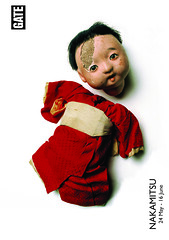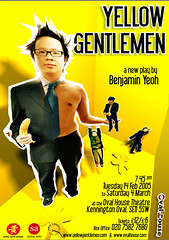Exquisite Pain
Forced Entertainment’s Exquisite Pain and I got off on the wrong foot. The Riverside suffered a change of policy, so I couldn’t take my full plastic cup of wine in (they really should tell you this at the bar or the ticket desk) and then the first scenes I catch sight of are; other people with drinks, and the performers with drinks. OK, so maybe the performers should be allowed drinks. Then so should I. Slightly irrational rant over.
Over a red telephone, in a hotel room in India:
“I wanted to come and tell you”
“Have you met another woman?”
“Yes.”
“Is it serious?”
“I hope so.”
“Poor me.”
Sophie Calle’s break up, when she was about 30 and caused partly by her decision to go to Japan for 3 months, is told and retold (with the variations memory and time give) about 90 times.
5 days ago, I broke up with the man I love
8 days ago, I broke up with the man I love
10 days ago, I broke up with the man I love…
90 days ago, I broke up with the man I love…
98 days ago, the man I used to love…
Interspersed, alternatively, with the echoes of her story, are the stories of friends and acquaintances of the most traumatic event in their lives, most often involving death, suicide or break up.
I liked the piece but I do wonder if it could have been staged more effectively. Note, I have a bias in that a piece I created called Confessions that uses very similar devices to Forced Entertainment (but based on confessions), so I made several decision in my work which are different to FET’s but which address the same problems.
[Not to suffer from hubris, FET have been creating this type of work for longer and much more successfully than me, but not using some one else’s (Sophie Calle’s) text.]
Performatively, the two actors sit at desks with the text. High above them a small screen with images. The woman actor speaks Sophie’s story first. The man speaks a friend’s story. Then the woman tells Sophie’s. Then the man… They start, purposefully I believe, with very little emotion in their readings but also at very even, fairly slow pace.
This even rendition and slow pace may have been a good choice. It allows the text simply “to be”. However it also takes the tonal range and emotion out of the stories. It’s of note that late on the man seems to slip into emotion but, in my view, in a haphazard way. My conjecture is that some stories would be more engaging at a musical pace and emotional range, but that other stories may not. Those choices of how to tell the stories could be made in the moment, but would need to be made clearly.
My other thought, was that the piece was funnier than it came across on the night I saw it. [A few people left half way through, which probably didn’t help]. The even handed narration killed some of that. Lastly, the images could have had a larger presence as they provided an important counterpoint to many of the stories.
Criticism of the performance aside, the work itself is a thought provoking, fully realised piece of live art. It takes you through the pain, humour, boredom of trauma and break up. It examines an event through the lens of time and memory and through the stories it touches on many stories and emotions the listener empathises with. I think that qualifies as good art in most people’s books.
There’s not that much work out there like it, and although I’d like to have seen different renditions or staging of it, I fully recommend it.
comments
2 Responses to “Exquisite Pain”


I don’t get your quibbles with Exquisite Pain. It was the pared-down-ness of the staging that made the piece so effective.
I was trying to say, perhaps inelegantly, that in pacing some of the stories so ploddingly and stripped of the emotion of the stories that they lost some of the power to emotionally engage and dare I say it, slip in to unnecessary banality/boredom (although perhaps this was the point). However, not the power to provoke in terms of the nature of trauma and how we view these events through the lens of time and memory.